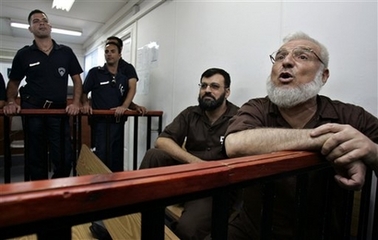Arab League plans first Israel mission
(AP)Updated: 2007-07-09 08:48
JERUSALEM - The 22-country Arab League will send envoys on a historic first mission to Israel this week to discuss a sweeping Arab peace initiative and how it might prop up embattled Palestinian President Mahmoud Abbas, Israeli and Arab diplomats said Sunday.
An official League visit would be a diplomatic coup for Israel. The League historically has been hostile toward the Jewish state, but has grown increasingly conciliatory in response to the expanding influence of Islamic extremists in the region - a concern underscored by Hamas' violent takeover of the Gaza Strip last month.
Jordan's foreign ministry said the Jordanian and Egyptian foreign ministers would arrive in Jerusalem on Thursday for talks with Prime Minister Ehud Olmert and other Israeli officials.
Israeli Foreign Ministry spokesman Mark Regev said the foreign ministers would lead an Arab League mission to Israel to discuss the Arab peace plan, which would trade full Arab recognition of Israel for an Israeli withdrawal from all lands captured in the 1967 Mideast war and the creation of a Palestinian state.
"This is the first time the Arab League is coming to Israel," Regev said. "From its inception the Arab League has been hostile to Israel. It will be the first time we'll be flying the Arab League flag."
The two foreign ministers, Abdul-Ilah al-Khatib of Jordan and Ahmed Aboul Gheit of Egypt, whose countries have peace agreements with Israel, have been designated as the League's official point men for the Arab peace initiative.
Israeli Foreign Minister Tzipi Livni met them in Cairo in May for the first official, public talks between the two sides, and the Arab peace initiative was the focus.
In another gesture of support for the moderate Palestinian leadership, Livni met late Sunday in Jerusalem with Palestinian Prime Minister Salam Fayyad, Israeli media reported. Several days ago Fayyad met with Defense Minister Ehud Barak.
Israel rejected the plan outright when Saudi Arabia first proposed it in 2002, at the height of the Palestinian uprising. But it softened its resistance after moderate Arab states endorsed the plan again in March, sharing their concerns about Iran's growing influence.
Israel has welcomed aspects of the plan, while rejecting its call for a return of all of the West Bank and an implied demand to resettle within Israeli borders the Palestinian families who became refugees from the 1948 war that followed Israel's creation.
Moderate Arab countries and the West have been pushing for renewed Israeli-Palestinian peacemaking since Gaza fell to Hamas, a group that refuses to recognize Israel's right to exist and has killed more than 250 Israelis in suicide bombings. Abbas ejected Hamas from government after the Gaza takeover and set up an emergency Cabinet of loyalists that has Western and moderate Arab backing.
Regev said renewed relations with the Palestinian government following the
shake-up and the linkage to a broader Middle East settlement would be at the
heart of discussions with the Arab League envoys.
| 1 | 2 |  |
|
|
|
||
|
||
|
|

